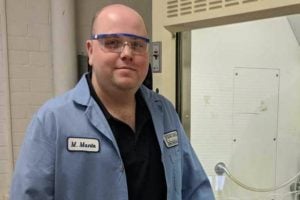
As fourth-year PhD candidate Michael Manto was completing his bachelor’s degree in chemical engineering at Lehigh University, Johns Hopkins was not on his PhD radar because he mistakenly believed the Department of Chemical and Biomolecular Engineering was “all bio.”
Manto’s sister, a Hopkins undergrad at the time, quickly set him straight, filling him in on her own advisor’s energy and sustainability research. The next year, Manto started his doctorate in the same advisor’s lab, where he continues to use nanotechnology to sustainably extract, produce, and recover nitrogen and phosphorus nutrients—the key ingredients in fertilizer—from renewable biomolecular feedstocks and other sources like wastewater.
Manto, originally from Philadelphia, explains that fertilizer is increasingly necessary because most soil lacks the nutrients to support the massive scale on which many crops are grown today, but that standard fertilizer production methods are expensive and unsustainable. Nitrogen is typically derived from ammonia in an energy-intensive process costing billions a year; phosphorus is derived from phosphate rock, whose supply is finite and non-renewable.
Manto’s group is investigating “gentle” reaction conditions using cerium oxide nanomaterials in water at room temperature. Such conditions have been explored for phosphorus but only in a limited medical context, and are brand new for nitrogen. Manto’s team also employs zeolites to isolate and recover nitrogen and phosphorus and eventually convert it to fertilizer. Characterization is a challenge in these water-based systems, but Manto believes it’s not insurmountable.
“We’re convincing people in the field that it’s a worthy cause,” he says.
An unusual feature of his research is that it combines two typically separate chemical engineering disciplines: heterogeneous catalysis and ion exchange separations. Developing in-depth knowledge in both areas is already opening doors for Manto, who earned two travel awards to the 2017 American Institute of Chemical Engineers (AIChE) meeting, and won an award—as well as the opportunity to present his research—for best poster at the 21st Annual Northeast Corridor Zeolite Association (NECZA) Meeting.
“It was nice to see that happen,” Manto says. “We realize we’re developing a new area of expertise that is unfamiliar to other researchers, but many people are noticing, and that’s a great sign.”
When he completes his degree, Manto hopes to undertake R&D in an industrial setting. He also hopes to continue in the mentoring role he’s taken on in the lab, where he’s supported undergrads as they co-authored papers, won research grants, and presented at conferences. “They make really positive contributions to our research, and I couldn’t have gotten half of this done without their help,” Manto says. “It’s rewarding in both directions.”
His mentees have also been part of the experience Manto most anticipates carrying with him into the future: learning how to lead a team to have the greatest impact on a project. “To have people working together, that’s the secret of successful research,” he says. “To have that enthusiasm and collaboration; you can achieve so much when you have a good team.”